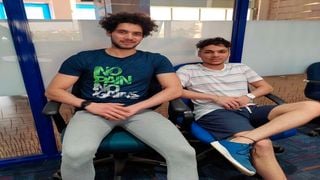
Kenyan brothers, Tabrez Kara (left) and Aftaan Kara, safely evacuated from Ukraine following the attack by Russia.
| Victor Raballa | Nation Media GroupNews
Premium
Safe at last: Two brothers tell of war nightmare in Ukraine
What you need to know:
- Kenyan students say on arrival that the experience is worse than what is seen on TV.
- Two brothers among first Kenyan students to arrive in the country from the war-stricken Ukraine.
On the dawn of February 24, when Russia launched a large-scale invasion of Ukraine, one of its neighbouring countries to the south west, it marked the beginning of a steep escalation to a conflict that began in 2014.
Kenyans, like other foreigners, found themselves trapped in a war they knew nothing or little about.
“When you watch it on TV, it’s different from experiencing it,” said Tebrez Kara, a fifth-year Kenyan medical student at Kharkiv National Medical University situated on the Eastern side of Ukraine. He and his brother, Aftaan Kara, spoke to Sunday Nation shortly after landing in Kenya.
The brother, a fourth-year medical student, was at Ternopil Medical University. They are among the first Kenyan students to arrive in the country from the war-stricken Ukraine.
Being in a war zone, especially in a winter like it is in Ukraine at the moment, means prescribing the kind of death you want for yourself, Aftaan says.
“You choose your kind of death. Opting out or staying there longer would mean death by hypothermia, by hunger, or by the bullets.”
By 5am, he (Aftaan) is always up. But on the fateful dawn, he missed the alarm, only to be woken up by air raid sirens blaring in the morning and explosions audible from the city centre.
The blasts, he remembers, could be heard from far, but they became louder as the day advanced.
“The blasts were so thunderous. It was about 5.30am Ukrainian time. It’s winter, and I first thought it was thunderstorms,” Tebrez narrates.
The flashes in the sky continued as the day broke. Then it became apparent to him that staying on the eastern side of Ukraine, Kharkiv, was no longer safe.
Hungry and thirsty
The Russians were invading from the West, East and South. The safest region, therefore, was to the western city Lyiv and crafting a way out of Ukraine.
The journey to the western side, he says, took about 15 hours, and travelling to the western cities from Kharkiv, he would have to go through Kyiv, which was one of Russia’s targets.
The safest way in and out of Kyiv was through the metro, which was already overwhelmed by the influx of passengers headed for the capital on their way out of the country.
“When we got to Lyiv, some 60km from the border with Poland, everything was shut. I was hungry and thirsty. It was about 6pm and, I had decided to get out of the country dead or alive,” he recalled. “I advanced towards the border, but there was immense traffic and I had to walk the rest of the journey.”
As he left Kyiv, Tebrez recalls, the city was being guarded by extra soldiers as volunteers dug trenches and placed sandbags.
The Ukrainian soldiers were positioning tanks to defend their capital to the tooth. Tension was palpable, he remembers. It was at this point that he knew the journey ahead would be difficult.
But he also worried about his brother, who was also in another city within Ukraine. Further complicating the equation was the fact that Ukrainians are allowed to have guns in times of war.
“I only needed my phone to keep my family abreast and travel documents. But I constantly worried whether my brother was safe,” he recounts. “I feared that my brother would be unlucky.”
Made it out alive
“When in a war zone, you lose track of time. You live a day at a time. You only count sunrises and perhaps sunsets. But nothing pains as seeing some of the friends you embarked with on the journey home die on the way, and you have no other option but to leave them on the fields in pursuit of freedom yonder,” Aftaan narrates.
“I only came back with four pairs of clothes and my travel documents. My sleep patterns have been affected from having to stay awake five days continuously.”
Aftaan is lucky to have made it out alive. While he hopes normalcy would return soon so that he can finish his studies, he says, “My heart bleeds for the Ukrainians who have no other choice but to defend their homeland.”
The temperatures were hitting negative 10 degrees Celsius, he recalls. “Roads were closed and we were redirected countless times.”
In the company of about 2,500 students. They were tired and had to spend nights beside the road and in the cold.
His brother, Tebrez, survived on water for the whole of the journey — from when he decided to get to the Polish border from the east. He says he “would like to finish my education at the university. But if there’s no other option, then I’ll have to transfer.”
At the border, Aftaan says, Ukrainians were prioritised. At some point when it was proving difficult to cross to Poland, Aftaan recalls asking the Ukrainian officials to hand him the gun “to help them protect their jurisdiction”.
He was now ready to help the Ukrainians defend their country.
“I had given up on returning to Kenya alive. But the border officials told me they had stamped my passport and they would not be accountable for my death in the battlefield,” he narrates.
“It’s emotional seeing families separate at the border because only mothers and children are allowed to cross over to Poland.
“If you have relatives or relatives in Ukraine, please, pray for them. Over there, the war is getting worse by the day.”




